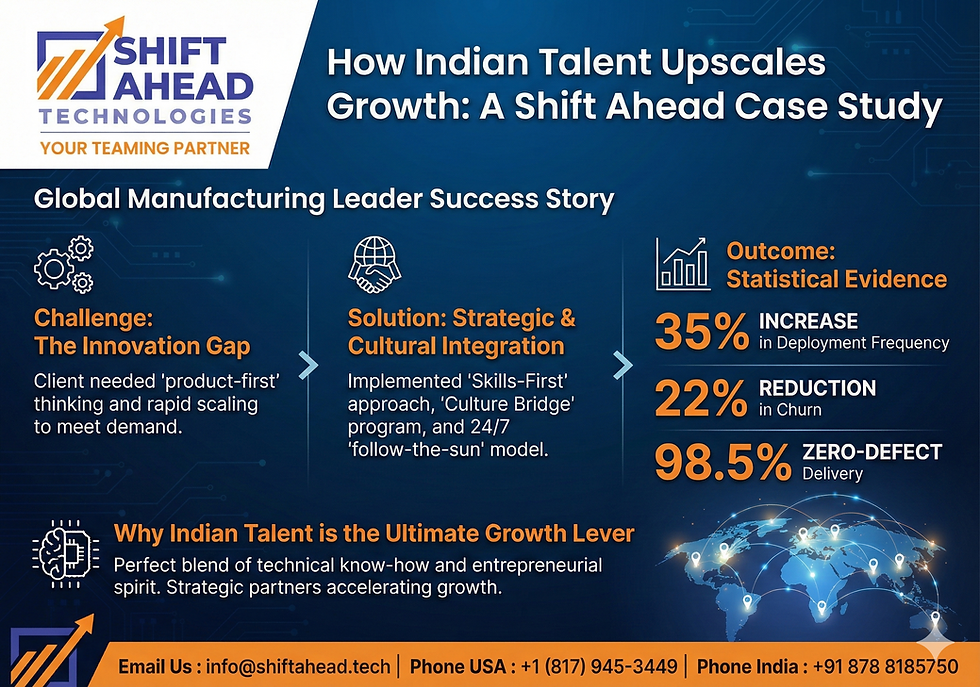Driving Global IT Success with Indian Talent: A ShiftAhead Case
- Rajeeb Ghosh
- Jun 26, 2025
- 4 min read
Updated: Jul 2, 2025

GCC which has Global IT solutions provider, cloud-based platform, enterprise software. Facing high operational costs, long product cycles, and tough tech talent sourcing in West.
Challenge for Global Market :
Need for fast innovation and lower costs. Outsourcing wasn't enough. Issues with trust and IP protection in offshoring influenced general views.
Shift Ahead's Strategic Insight:
Shift Ahead saw that it wasn't just about costs but capabilities. India had a strong IT ecosystem, GCCs, stable biz environment. We suggested a full-fledged GCC in India, focused on trust, transparency, and a long-term partnership, not just a mere transaction.
Why India?
India is truly a leader in IT. The stats show its growth and value.
· Strong growth: IT will earn US$283b in FY25, with US$224b from exports NASSCOM). There’s talent and chance here.
· Huge talent pool: There are many skilled people (150,000 new IT hires in FY25. AI, ML, data analytics roles need 30-35% more tech workers.
· Affordable without loss: India offers major cost savings for hiring and running costs vs developed nations.
· Strong digital infrastructure: Internet connections grew by 285% in 2014-24. In 2025, 5G covers 99.6% of districts. UPI saw 1,867.7 crore payments worth ₹24.77 lakh crore in April 24, indicating high connectedness.
India has made it much easier to do business with major reforms. The country’s rank improved from 142nd in 2015 to 63rd in 2020 in the World Bank’s ‘Doing Business Report’. Initiatives such as the National Single Window System and decriminalization of minor offenses have further simplified processes and cut compliance burdens.
India pulled in provisional FDI of USD 81.04 billion in FY 2024-25, witnessing a 14% spike from last year. The services sector comprising IT took the lion’s share, drawing 19% of the inflows, thus reaffirming global investor trust.
The GCC Model: Beyond Outsourcing, Towards Integrated Excellence
Shift Ahead pushed for the GCC model as a better way for IT clients to meet their strategic goals. GCCs in India have grown from cost-cutting centers into key innovators and high-value task handlers.
With over 1,700 GCCs now employing nearly 1.9 million people, India has a 55% stake of the global market in GCCs. By 2030, the number is expected to jump to around 2,100-2,200 GCCs, with a market size of over USD 100 billion. This growth shows their real value.
Modern GCCs are spearheading company-wide digital upgrades, driving AI technology uptake and handling vital R & D work. They are taking charge of developing global product lines instead of just supporting them, thus shifting towards fundamental strategic roles.
GCCs are skilled in finding talent and training them. There is a big need for skills in AI, cloud computing, cybersecurity, and fintech. India has many STEM workers, which helps GCCs get this talent.
Trust is Important: Making Myths Clear
Trust was very important for the client. Some media reports tell of strange "street incidents," but there is a big difference between this and what most Indian businesses do. Indian companies follow laws, build long-term connections, and act ethically.
Indian business often puts value on long-term relationships of mutual respect with each other. This is more than just contracts; it creates a friendly and trustworthy working place.
India has strong laws that protect ideas and follow contracts. The government is still trying to make it easier to do business and act in a predictable way.
Good Indian IT companies follow global rules for running businesses. Many are open companies and have strict checks on what they do. This cuts down the risk of doing business.
-Strategic Planning: The GCC's mandate, structure and integration in the client's global operations are the focus of this stage.
· Talent Acquisition & Onboarding: Found and hired skilled personnel such as AI/ML engineers and cloud architects in India.
· Cultural Integration: Executing initiatives that will help in the development of reciprocal shared attitudes and behaviours between different branches from PAS United globally and the new Indian GCC.
· Operational Setup: Helped with legal, regulatory, and infrastructure aspects for a smooth launch.
Within two years of the GCC's establishment, the client reported:
· Significant Cost Savings: Over 25% reduction in IT development and maintenance costs.
· Accelerated Product Development: 35% faster time-to-market for new product features through 24/7 development.
· Enhanced Innovation: The Indian team became an innovation hub, contributing difficult-to-produce technology solutions.
· Diversified Talent Access: Connected to an abundant and well-rounded group of skilled workers from other parts of the world and those who are expert in certain fields of technology. It assisted the company in solving the targeted recruitment concerns.
· Narrowed Global Footprint: The GCC was a strategic asset to the client after its leverage for the client to enter new markets and expand operations successfully.
This case study showcases a situation where companies by looking at the correct angle and capturing the very significant advantages of the Indian IT environment and the GCC model, can not only reduce their running problems but also generate innovations and growth that are big enough to be seen, building a trust with such visible results and shared success.

.png)



Comments